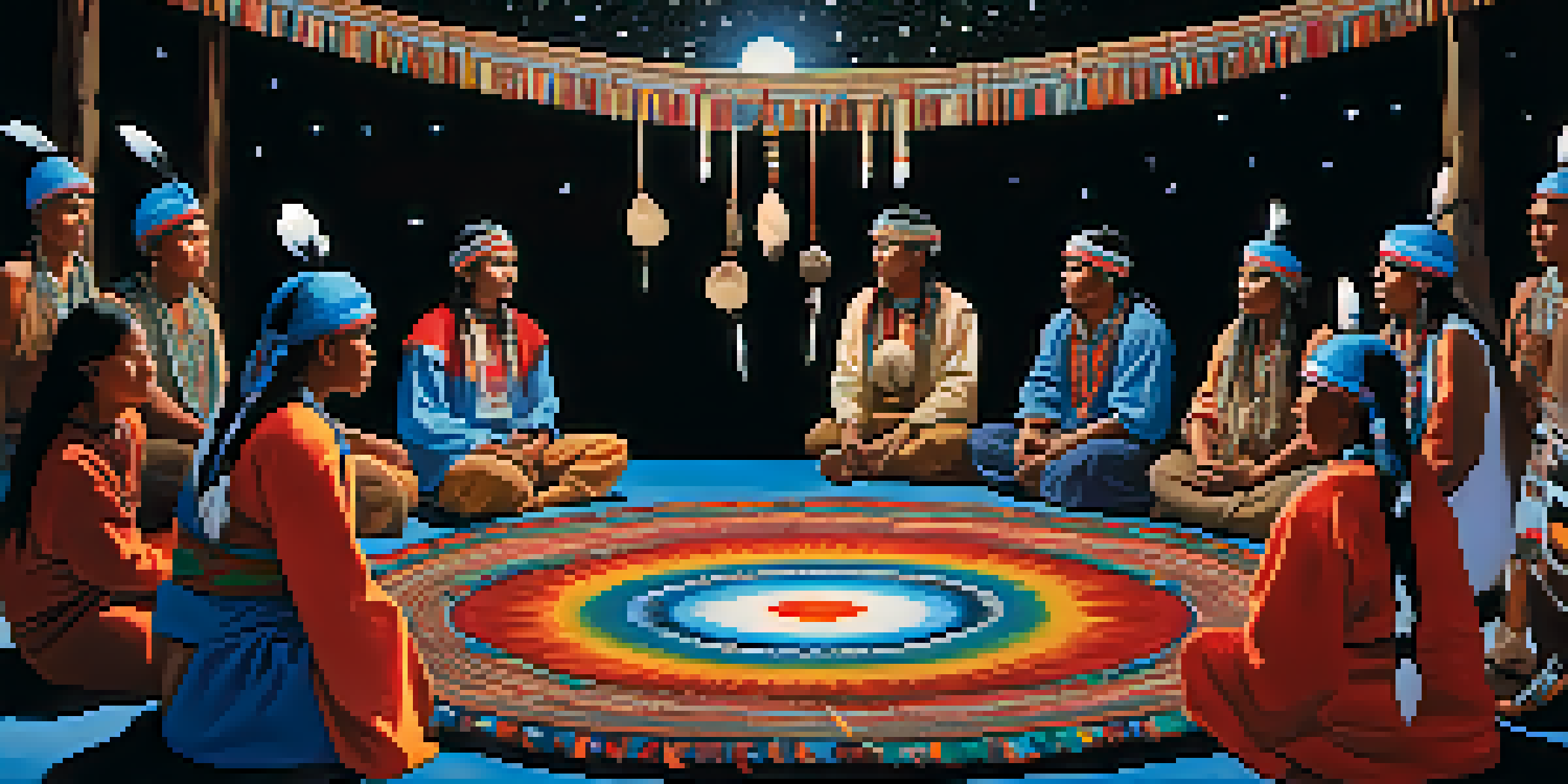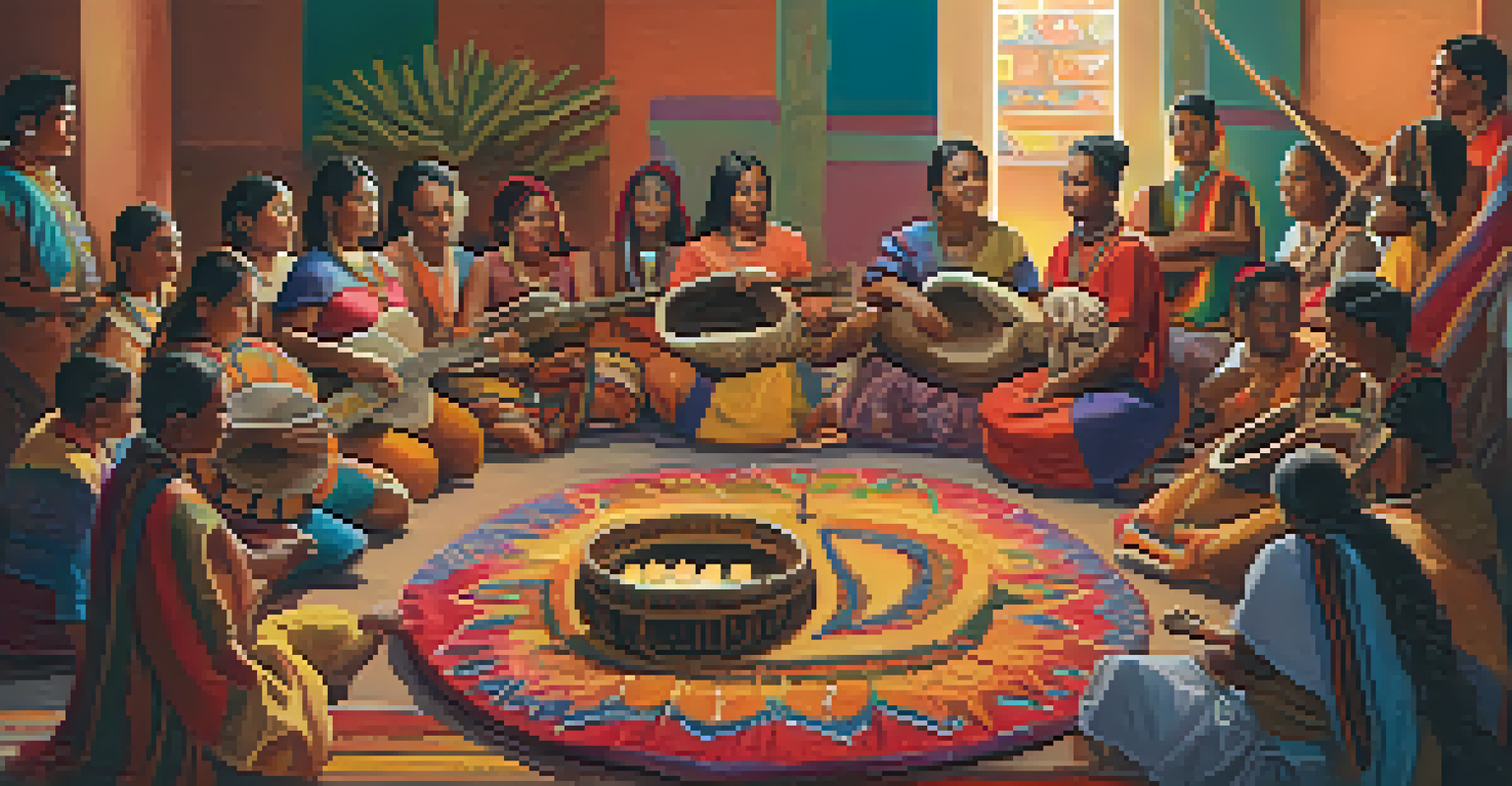Men's Participation in Peyote Ceremonies: A Gendered Analysis

Understanding Peyote Ceremonies Within Indigenous Cultures
Peyote ceremonies are sacred rituals primarily practiced by Indigenous peoples in North America, particularly among the Native American Church. These ceremonies often revolve around the use of peyote, a psychoactive cactus, which is consumed for its spiritual and healing properties. Understanding these rituals requires a deep appreciation of the cultural contexts in which they occur, highlighting the intersection of spirituality, community, and tradition.
Peyote is not merely a substance but a bridge to the spiritual world.
In many Indigenous cultures, peyote is not merely a substance but a bridge to the spiritual world. Participants engage in prayer, singing, and communal activities, which foster a strong sense of belonging and identity. This communal aspect is crucial as it emphasizes the collective nature of the experience, where the roles of each participant, including men, are often defined by tradition and community expectations.
Moreover, these ceremonies serve as a means of cultural preservation, where knowledge is passed down through generations. As we delve into men's participation in these rituals, we begin to uncover the layers of gender dynamics at play, reflecting broader societal structures and the evolving roles of men within these spiritual practices.
Historical Context of Men's Involvement in Peyote Use
Historically, men have played significant roles in Peyote ceremonies, often acting as leaders, facilitators, or healers. These roles have been shaped by a combination of cultural norms and the social structures prevalent within Indigenous communities. Understanding this historical context is vital, as it sets the stage for current practices and perceptions regarding gender roles in these sacred spaces.

In many tribes, the responsibilities of men in these ceremonies include not only the administration of peyote but also the orchestration of the ritual proceedings. This leadership role has traditionally been viewed as a rite of passage, marking a man's journey into adulthood and spiritual maturity. However, the dynamics of these roles have evolved, especially in contemporary settings where gender equality is increasingly emphasized.
Peyote Ceremony's Cultural Role
Peyote ceremonies serve as sacred rituals that foster community, spirituality, and cultural preservation among Indigenous peoples.
As we trace the evolution of men's roles, we can see how external influences, such as colonialism and modernization, have reshaped these traditions. This historical lens allows us to appreciate the complexities surrounding men's participation and the ongoing dialogue about gender within these sacred practices.
Gender Dynamics: Men's Roles in Peyote Ceremonies
When examining Peyote ceremonies through a gendered lens, we find that men's roles are both revered and scrutinized. Men often occupy positions of authority, which can sometimes overshadow the contributions of women in these spiritual rituals. This dynamic raises important questions about equality and representation within the context of these ceremonies.
The future of men's participation in Peyote ceremonies hinges on the willingness of individuals and communities to embrace change.
While men may lead the ceremonies, women also play critical roles, such as preparing the peyote and participating in prayers and songs. The interplay between these roles can create a tension that reflects broader societal attitudes towards gender. Recognizing this duality is crucial for fostering an inclusive environment that honors the contributions of all participants.
As communities navigate these gender dynamics, many are actively working to create more equitable practices. This includes re-evaluating traditional roles and integrating women's voices into the leadership of Peyote ceremonies, thus enriching the spiritual experience for everyone involved.
Contemporary Shifts in Men's Participation and Leadership
In recent years, there has been a noticeable shift in how men's participation in Peyote ceremonies is viewed and practiced. Many Indigenous communities are embracing a more inclusive approach, recognizing the importance of women's involvement alongside traditional male leadership. This change reflects a broader cultural movement towards gender equality and respect for diverse voices.
Men are increasingly taking on roles that support this inclusivity, such as advocating for women's rights within the ceremonies and promoting joint leadership models. This evolution not only enriches the ceremonial experience but also fosters a sense of unity among participants, creating a space where everyone's contributions are valued.
Evolving Gender Dynamics
Men's roles in Peyote ceremonies are shifting towards inclusivity and collaboration, reflecting broader societal movements for gender equality.
By embracing these contemporary shifts, Peyote ceremonies are becoming more reflective of the values of equality and collaboration. As we witness these changes, it becomes clear that the future of these spiritual practices lies in recognizing and honoring the diverse roles that both men and women play.
Social and Cultural Implications of Men's Involvement
Men's participation in Peyote ceremonies carries significant social and cultural implications that extend beyond the ritual itself. As men engage in these spiritual practices, they also reinforce or challenge cultural norms surrounding masculinity and spirituality. This dual role can lead to a redefinition of what it means to be a man within these communities.
For many men, participating in Peyote ceremonies offers an opportunity for introspection and emotional expression, which are often stigmatized in traditional male roles. This newfound space for vulnerability can foster personal growth and community healing, creating a more holistic understanding of masculinity that includes emotional and spiritual dimensions.
Furthermore, as men begin to embrace these multifaceted roles, they can become advocates for change within their communities. By challenging outdated perceptions of gender, they contribute to a cultural evolution that promotes inclusivity and respect, allowing for a richer, more diverse spiritual experience.
Case Studies: Men's Experiences in Peyote Ceremonies
Exploring individual case studies can provide deeper insights into the complexities of men's experiences in Peyote ceremonies. For instance, some men describe feeling a profound sense of connection to their heritage and community during these rituals, while others grapple with the weight of expectations placed upon them. These personal narratives highlight the diverse emotional landscapes navigated by men participating in these sacred practices.
One case study might focus on a young man who, after participating in several ceremonies, finds a renewed sense of purpose and identity. His journey reflects the transformative power of these rituals and the role of men in fostering a sense of communal belonging. Such stories underscore the importance of individual experiences within the broader cultural context.
Personal Growth through Rituals
Individual experiences within Peyote ceremonies reveal the transformative power of these rituals, offering men opportunities for introspection and emotional expression.
Conversely, another case may reveal the struggles faced by men who feel pressured to conform to traditional roles. This highlights the need for ongoing dialogue about gender within these ceremonies, encouraging men to express their authentic selves while honoring the spiritual significance of the rituals.
Future Directions: Men's Roles in Evolving Peyote Practices
Looking ahead, the roles of men in Peyote ceremonies are likely to continue evolving as communities adapt to changing cultural landscapes. The growing emphasis on gender equality and inclusivity will likely inspire new practices and approaches that redefine traditional roles. This evolution presents an opportunity for men to engage in deeper spiritual exploration while supporting the contributions of women.
As more communities embrace collaborative leadership models, men can play an active role in advocating for equitable practices within these ceremonies. This shift not only enhances the spiritual experience but also fosters a greater sense of community and shared purpose among participants. By working together, men and women can enrich the rituals and ensure their relevance in contemporary society.

Ultimately, the future of men's participation in Peyote ceremonies hinges on the willingness of individuals and communities to embrace change. By recognizing the value of diverse perspectives, these sacred practices can continue to thrive, reflecting the rich tapestry of Indigenous culture and spirituality.